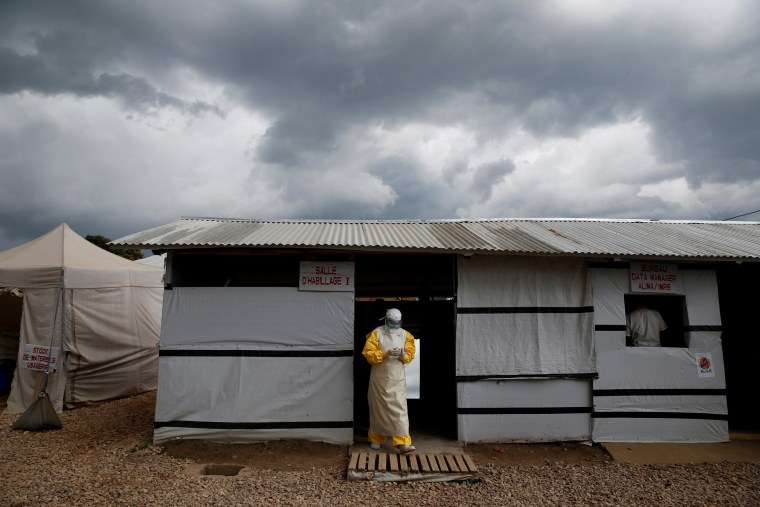Ebola is a virus that causes an especially deadly and virulent form of hemorrhagic fever. Patients bleed internally and usually die of shock and the effects of high fever, vomiting and diarrhea. There’s no good treatment and no cure.
The 2014-2016 West African Ebola epidemic started in Guinea and was the largest and most complex outbreak since the virus was first discovered in 1976, according to the World Health Organization.
The current epidemic in the Democratic Republic of Congo is now the second largest outbreak, with more than 2,000 cases and 1,390 deaths.
The virus spreads by direct contact, either between people or with bodily fluids from someone very ill with Ebola, or who has died from it.
What are the symptoms of Ebola?
The first symptoms include the sudden onset of fever fatigue, muscle pain, headache and sore throat. That’s followed by vomiting, diarrhea, rash, impaired kidney and liver function, and in some cases, internal and external bleeding, such as oozing from the gums or blood in the stool.
The incubation period — the time between infection and when a person begins to show symptoms — is two to 21 days, according to WHO.
When did Ebola originate?
Ebola virus disease first appeared in 1976 in two simultaneous outbreaks in Africa, WHO notes. One of them took place in a village near the Ebola River, which is how the virus got its name. Ebola is transmitted to people from wild animals.
Are there survivors of Ebola?
Yes, early diagnosis and treatment can often save lives. If patients are treated soon enough, saline solution can help stabilize them while their body fights the infection. Today, there are more than 10,000 survivors of Ebola virus disease, WHO reports.
Dr. Kent Brantly, an American doctor, and Nancy Writebol, an aid worker, were flown back to the U.S. for treatment after they were infected with Ebola in West Africa in 2014 and both recovered.
Two nurses infected when they treated the first person diagnosed with Ebola in the United States, Thomas Eric Duncan, also recovered.
In West Africa, even with late and minimal treatment, some people pulled through. Studies suggest some people can be exposed to the virus and never even get sick.
But Ebola survivors can suffer serious, long-term effects, from headaches and memory loss to vision problems and infected semen.
How many casualties are there of Ebola?
More than 28,000 confirmed, probable and suspected cases were reported in the 2014-2016 West African Ebola epidemic, according to WHO. Of those, more than 11,000 people died.
Ebola kills anywhere from 50 to 90 percent of patients, depending on the strain and where the outbreak is.
Is there an Ebola vaccine?
There is an experimental vaccine that's been shown to be effective. Researchers use ring vaccination, which calls for vaccinating people who have been in contact with patients, and contacts of contacts.
FOLLOW NBC HEALTH ON TWITTER & FACEBOOK
